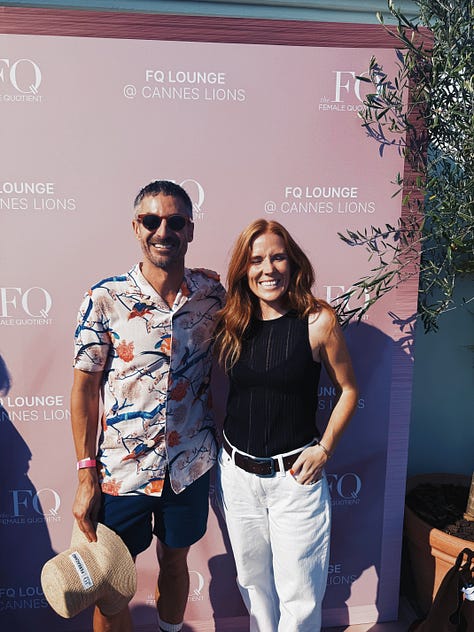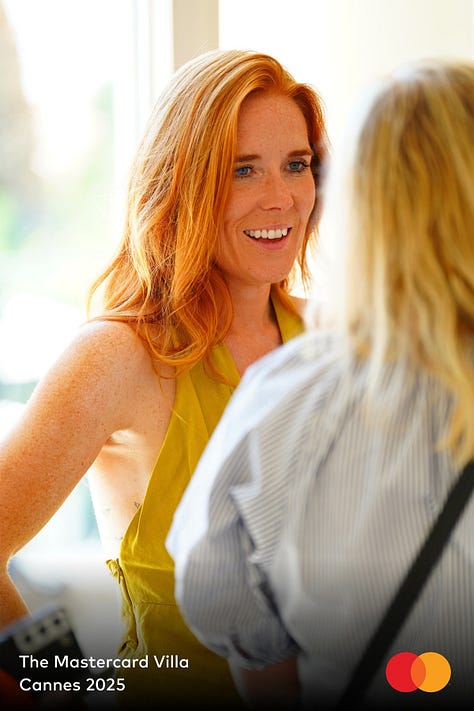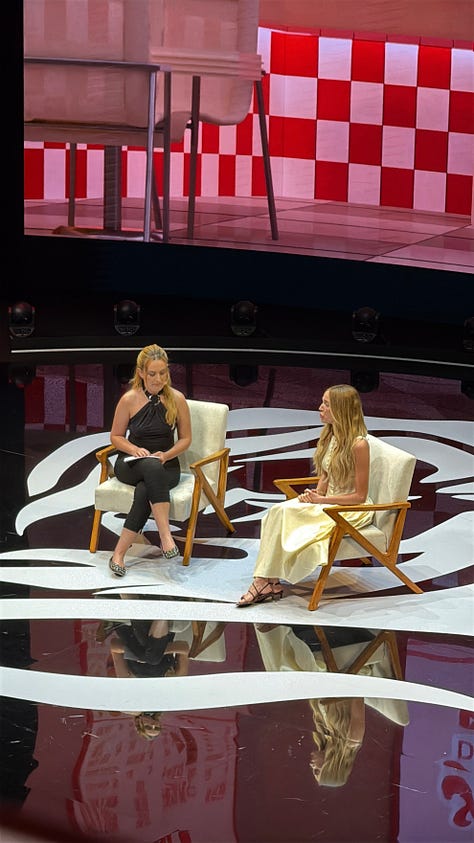Cannes Dispatch: The Future of Fandom is Being Rewritten
WSJ and Mastercard panels
Thank you for being here. You are receiving this email because you subscribed to Idée Fixe, the newsletter for curious minds. I’m Toni Cowan-Brown, a tech and F1 commentator. I’ve spent the past five years on the floor of way too many F1, FE, and WEC team garages, learning about the business, politics, and tech of motorsports. I hope you’ll stick around.
⏳ Reading time:
I attended my first 24h of Le Mans and Cannes Lions back to back and I would certainly not recommend doing these two back to back to anyone, and yet I would do it all again in a heartbeat if I had to. I have a write-up about Le Mans almost finished, but first, I want to talk about Cannes Lions.
At Cannes Lions this year, I had the opportunity to sit on two very different - yet entirely converging - panels. One with The Wall Street Journal and IBM on how AI is reinventing sports fandom. The other, with Mastercard, focused on the creator economy’s explosive role in shaping that fandom. The message from both was clear: the old rules of engagement are out. The future is participatory, hyper-personalised, and powered by fans themselves.
And we would be fools not to take fans seriously - enter in the concept of the ‘proffesional fan’ - as they are so much more than a bi-product of sports. They are currently shaping the sports industry and new rules of engagement apply. Here’s what I walked away thinking - and why I think it matters.
AI Isn’t Just Changing Sports - It’s Rewriting the Playbook for Fandom
The most transformative thing AI is doing in sports? It's not automation or analytics. It's intent-driven personalisation - i.e. delivering the right content, in the right format, on the right platform, to the right fan. That could be a Leclerc overtake highlight seconds after it happens or a perfectly timed ticket offer based on your location and favourite team.
In Formula 1, a sport where 99% of fans will never attend a race in person, this becomes even more critical. AI allows us to reach fans through the screen in ways that feel intimate, participatory, and real-time. But a word of caution: not everything needs to be monetised. The most powerful fan moments are often the most organic. Subcultures thrive when they’re left alone to be weird and wonderful.
Sponsorship is Evolving from Logo Slap to Story Engine
One of the clearest shifts I’m seeing - and one AI is accelerating - is how brands now approach sponsorship. The best ones aren’t asking “Did fans see our logo?” but “How did our presence shape the experience?”
AI enables real-time measurement and storytelling. Sponsorship is becoming modular and adaptive - tweakable week to week. Just look at WhatsApp’s F1 integration, LEGO’s Miami GP stunt, or IBM’s AI-generated Wimbledon commentary. These aren’t just logos on assets. They’re co-authors of the fan experience.
The Creator Economy Is Becoming the New Sports Media
The creator economy is booming and projected to hit nearly half a trillion dollars by 2027. But here’s what’s really fueling it: cultural portability. Creators are no longer merely followers of culture or even part of culture - they’re shaping it. They build community, not just content. They are responsible for the many sub-cultures we are seeing in and around sports.
And the most valuable creators in the next 12–24 months? They won’t be celebrities or lifestyle influencers. They’ll be “professional fans” who use AI to turn their niche passions into fan-led media companies. Think: fan-made Drive to Survive spin-offs, AI-powered highlight reels, multilingual communities hosted on Discord, not ESPN.
We need to stop equating niche with small. Some of the most impactful creators I’ve seen in motorsport aren’t household names but they are trusted. And that trust converts.
Younger Fans Are Driving the Innovation Loop — Not the Other Way Around
I’ve always wondered if it was tech that informed our new consumption habits or the other way around. My answer is still a little murky but there’s certainly a feedback loop happening right now between tech and fans, and make no mistake: fans are in the driver’s seat. Younger, global audiences aren’t waiting for the sport to change. They’re designing the version of it they want:
On TikTok, not TV.
With subtitles and creators who look and sound like them.
In WhatsApp chats, not stadiums.
We’re moving from a model of inherited fandom to one of identity-based allegiance. It’s not “Which team do you support?” anymore. It’s “How does this sport reflect who you are?”
And AI is scrambling to keep up - localising content, translating voices, adapting tone. That’s a powerful inversion. Tech used to shape behaviour. Now, fan behaviour shapes the tech.
What’s Next? A Smarter, Fan-Led Future
One of the questions I was asked last week at Journal House (WSJ’s HQ in Cannes for the week) was: If I could use AI to solve one challenge today, what would it be? And I think it would be this: bridging the gap between the casual fan and the die-hard and at scale.
Right now, most sports content either overwhelms the new fan or under-delivers for the core one. AI can help fix that by tailoring depth, tone, and delivery in real time, based on each viewer’s fandom journey. We’re not far from that future - the tools are here. The bottleneck is access and integration.
But the most exciting shift? Fans aren’t just reacting anymore. They’re building. And the next great sports platforms won’t come from studios. They’ll come from Discord servers, Reddit threads, and AI-native creator collectives.
If Wimbledon taught us anything, it’s that tradition and tech can co-exist. Innovation isn’t disruption - it’s elevation. And that’s exactly where fandom is headed: faster, smarter, more personal, and beautifully chaotic.
- Toni (on vacation)









🔗 The Numbers Don't Lie: Women's Sports Just Hit Different in 2025 | Regen Sports
We’ve seen the revolution that is women’s sports, and in particular, there’s a company that makes it their business. Parity is a leading platform for professional women athlete partnerships. Their mission to close the gender income gap in sports and beyond. Read here.
🔗 Michael Ruben on building Fanatics | Boardroom
Michael Rubin lives a life. Take a few swipes down your Instagram feed, and you’re likely to see him chopping it up with Hall of Fame athletes or Grammy Award-winning musicians. He’s seemingly everywhere all the time. Every big game, the most exclusive parties. Read here.






toni, this is so good and insightful, it made me mad and gave me massive cannes fomo, which is obvs the highest praise of all!!! <3